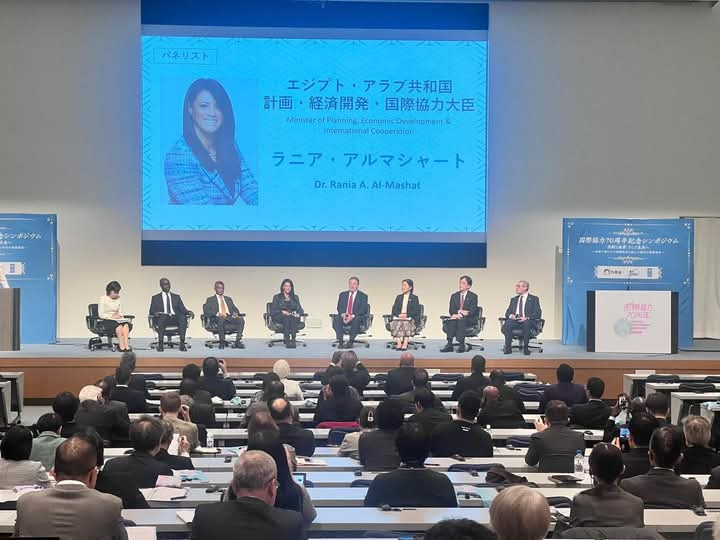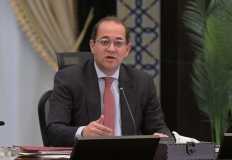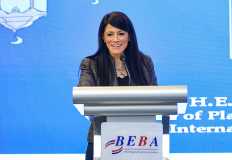
During the initial phase of her visit to Tokyo, Dr. Rania Al-Mashat, Minister of Planning, Economic Development and International Cooperation, participated in a high-level event organized by the Japanese Ministry of Foreign Affairs and the Japan International Cooperation Authority (JICA), commemorating the 70th anniversary of the commencement of development cooperation relations between Japan and numerous nations, including Egypt.
Attendees at the ceremony included Japanese Foreign Minister Ewaiya Takeshi, JICA President Akihiko Tanaka, United Nations Development Programme (UNDP) Director Achim Steiner, International Cooperation Bureau Director-General Hideo Ishizuka, Egypt's Ambassador to Tokyo Mohamed Abu Bakr, and representatives from Laos, the Maldives, Senegal, Tunisia, and other Japanese government and financial institutions.
In her speech during the session,
Al-Mashat reviewed the positive trajectory of Egyptian-Japanese relations,
emphasizing the strong alignment in their visions and shared positions. She
acknowledged the significant impact of this partnership on development,
highlighting the importance of joint efforts and multilateral cooperation in
addressing global challenges.
She stressed the crucial need for
expanding development cooperation and upholding principles of partnership and
mutual respect, particularly for developing nations facing complex challenges.
The Egyptian-Japanese partnership, especially in development cooperation, has
seen remarkable growth under President Abdel Fattah El-Sisi's leadership.
This progress is evident in the
high-level exchanges between the two countries, culminating in the elevation of
their bilateral relations to a strategic partnership in 2023. This significant
milestone paves the way for enhanced economic cooperation. As the two nations
commemorate the 70th anniversary of their partnership, they are poised to
embark on a new era of diversified economic collaboration.
The Minister highlighted that
Egyptian-Japanese relations have consistently aligned with and supported the government's
key priorities, notably contributing to the realization of Egypt's Vision 2030.
This partnership has fostered significant progress in various sectors,
including sustainable social and economic development, green transition,
renewable energy promotion, education development, human capital development,
inclusive growth, infrastructure development, private sector engagement, and
technical cooperation projects focused on capacity building, technical
education, and small and medium-sized enterprises development.
She noted that, in light of the
Egyptian government's priorities and the state's current direction, achieving
economic development and empowering the private sector are at the forefront of
the partnership between the two countries in the coming period. The government
is committed to providing all forms of support to the private sector, including
Japanese companies, to increase their investments in Egypt and to create a
conducive business environment and improve the investment climate. She
indicated the ministry's keenness to develop partnerships between Japanese
financial institutions and the private sector in Egypt to benefit from more
financing mechanisms.
She explained that the government
aims to increase the private sector's contribution to economic activities to
65% within three years. Therefore, we call for increased contributions from
international partners, including Japan, to support partnerships with the
private sector and stimulate investments through blended finance and
contributions from Japanese financial institutions to finance priority sectors,
especially industrial localization.
The Minister of Planning and
Economic Development highlighted several successful projects co-funded by
Japan, demonstrating the strength and impact of the bilateral partnership. These
include the universal health insurance project, some metro lines, and funding
for the construction of the Grand Egyptian Museum.
She emphasized that overcoming
the world's interconnected challenges, including geopolitical tensions,
necessitates international cooperation and collective action. She also stressed
the need for a more equitable and responsive global financial structure,
particularly for developing countries.
Shifting focus, she highlighted
the importance of cooperation between the Global South, emphasizing Egypt's
role as a gateway for Japanese investments and exports in Africa and the Middle
East. She explained that South-South and triangular cooperation are crucial for
accelerating development by fostering strong partnerships, facilitating
knowledge exchange, and replicating successful development models.
It is worth noting that
Egyptian-Japanese development cooperation relations began in 1954 and have
evolved over decades but have witnessed significant momentum under President
Sisi's administration, as they were elevated to the level of a strategic
partnership in 2023.
To further strengthen these ties, the Ministry of Planning and Economic Development facilitates an annual policy dialogue between Egypt and Japan. This platform brings together government and private sector officials to discuss key issues, drive cooperation forward, and establish future priorities.





